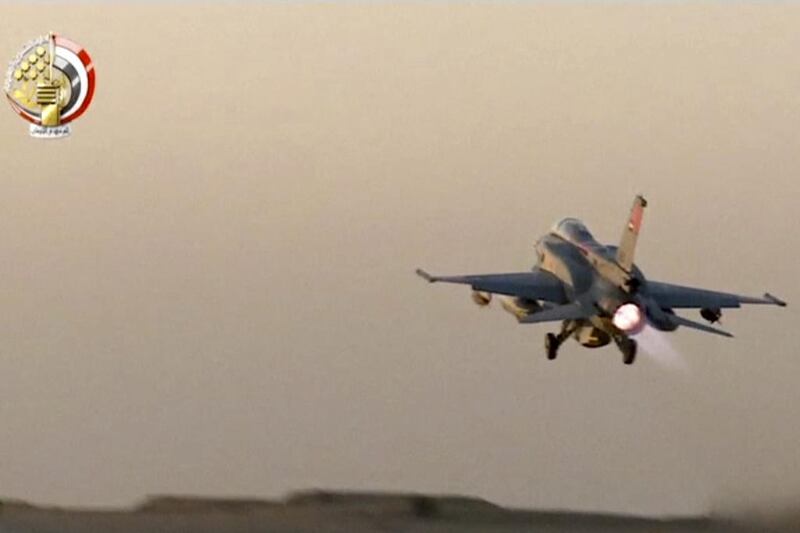Cairo // Another round of air strikes hit the eastern Libyan city of Derna on Monday after Egypt bombed militant bases there over the weekend in retaliation for the killing of 30 Egyptian Christians.
Witnesses said one of Monday’s strikes hit the western entrance of Derna, while two more pounded the south of the town.
Egypt said it had hit militant camps in Derna on Friday and the central desert town of Waddan on Saturday, but was yet to comment on the latest raids.
The air strikes come after masked militants boarded vehicles en route to a monastery in the southern Egyptian province of Minya on Friday, shooting dead 30 people. ISIL said it had carried out the attack.
Addressing the nation on Friday, Egyptian president Abdel Fattah El Sisi said Cairo had bombed a militant training camp in Derna in retaliation for the Minya attack, and would carry out further strikes on training camps.
The Egyptian military said the strikes hit targets including “training areas of the terrorist elements” that participated in the massacre.
Both Monday’s raids and Friday’s raids on Derna appeared to hit camps belonging to the Shura Council of the Mujahideen, a pro-Al Qaeda group opposed to ISIL.
The group has denied involvement in the Minya attack. Meanwhile, loyalties among Libya’s militant groups are ever-changing so it may be that the Shura Council of the Mujaheddin now has some connection to the militants behind the Minya attack.
Egypt’s strikes appear to have the implicit support of the United States. Egyptian foreign affairs minister Sameh Shoukry briefed US secretary of state Rex Tillerson on the bombing on Saturday, with Mr Tillerson offering condolences for the killed Copts and saying Washington backed Egypt’s efforts to combat terrorism.
The strikes come amid increasing international concern over the success of militants in establishing bases in Libya, following a suicide bombing in the British city of Manchester last week that killed 22 people. The bomber was of Libyan origin and had returned to Britain from a trip to Libya just four days before the attack. His father and brother, who live in the Libyan capital, have been arrested in Tripoli in connection with the bombing.
“The terrorist attack [on Coptic Christians] in Egypt, and a few days ago in Manchester, are stark reminders that the ugly face of terrorism knows no borders,” Nassir Abdulaziz Al Nasser, High Representative for the UN Alliance of Civilizations (UNAOC), said on Saturday. “It is also a reminder that we should all stand up together in our fight against terrorism.”
The reaction of Libya’s two rival governments to the air raids has been very different. In the eastern city of Tobruk, Libya’s elected parliament, the Cairo-allied House of Representatives, welcomed the strikes.
The spokesman for the House of Representatives’ eastern Libyan National Army (LNA), Colonel Ahmad Messmari, said on Sunday it was supporting the Egyptian strikes with bombing raids of its own on militant ammunition stores and training camps.
Meanwhile, the UN-backed Government of National Accord in Tripoli, whose forces oppose the LNA, condemned Egyptian strikes as a “violation of sovereignty”.
Egypt’s choice of targets are significant.
Derna, on Libya’s north-east coast, has long been a centre of Libyan militant activity. ISIL established its first Libyan base there in 2014, but a year later local militias allied to Al Qaeda forced the group out of the town.
Commentators have pointed out that ISIL is no longer in Derna. But Egyptian officials insist the militants responsible for Friday’s attack in Minya are based there, though Cairo is yet to name the group these militants belong to.
Egypt’s claim is bolstered by evidence that militant organisations based in Libya have an interchangeable membership.
Waddan, in the southern Sahara desert, is the base for several militant groups including the Benghazi Defence Brigades, made up of militants ejected from the city of the same name by the LNA, which is led by Field Marshal Khalifa Haftar.
Egyptian strikes, carried out by US-made F16 aircraft, are likely to be more precise than those carried out by the older LNA planes, and will likely swing the pendulum of Libya’s civil war further towards the Field Marshal Haftar’s forces, which have already gained ascendancy over militias aligned with the Government of National Accord.
Survivors and religious leaders have said the Minya attack was a well-planned, brutal, and sectarian massacre, in which men on the vehicles stopped were killed and the women wounded — some to ensure they could not have children if they survived.
Marco, a 14-year-old survivor, said masked gunmen dressed in military attire asked the victims to recite the Shahada, the Muslim profession of faith. When they refused, they were executed, he said on a late night news programme. Marco’s father was among the victims.
Bishop Agathon, bishop of the city of Maghagha where at least nine of the victims were from, told a Coptic TV station that the militants distributed a small pamphlet on fasting and Ramadan, before executing the men and looting the women’s valuables.
A volunteer medical student, who did not give his name for his family’s safety, said the hospital in Minya was too poorly equipped to deal with so many injuries.
It was the fourth major attack on Coptic Christians in Egypt in fourth months. In December, a suicide bomber attacked a church in Cairo that killed 25 people. And on Palm Sunday, two bomb attacks targeted churches in Tanta and Alexandria, killing 45 Christians.
Christians have become a primary target of Egypt’s ISIL affiliate in recent months. In February, more than 200 Christians fled the North Sinai city of Al Arish after being targeted for assassination by the extremists.
“We thank God that they’re now martyrs in heaven now,” said Hana Somayel, 53, whose brother, niece, and father were killed in the Minya attack. “They now have respite from the earth and our problems on this earth. Now they are in a better place.”
foreign.desk@thenational.ae





